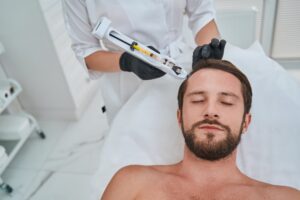Alternative Treatment for Alopecia Areata
Alopecia areata is an unpredictable autoimmune skin disease that may result in the loss of hair on the scalp. This disease affects about 1.7 percent of all people, including more than 4 million people in the United States. Alopecia areata most often develops during childhood, however it can occur in all genders, ages, and races. Alopecia develops when hair follicles are mistakenly attacked by the immune system.
Lymphocytes, which are a type of white blood cell in the immune system, around the hair follicles release chemical messengers called cytokines. Cytokines then reject the hair. Alopecia typically starts with one or more small bald patches on the scalp, this can progress into total scalp hair loss or complete body hair loss.
Symptoms of Alopecia Areata
 There are three stages of the disease:
There are three stages of the disease:
1) unexpected loss of hair;
2) enlargement of the patches of hair loss;
3) new hair growth
The process of hair regrowth can take months or years. Along with the loss of hair, there are usually no symptoms of Alopecia areata. The hair simply stops growing and then falls out. Patients often experience mild to moderate depression both emotionally and physically distressing because of societal views of hair loss and its effects.
Treatment for Alopecia Areata
While advances in medical science have made it possible to treat this condition with conventional medications and therapies, alternative treatments available at Sunridge Medical may be necessary for those who find traditional methods ineffective or too costly.
Sunridge Medical is dedicated to providing alternative treatments for patients suffering from alopecia. Our team of physicians are committed to helping individuals find the right approach to managing their condition and restoring their hair growth. Using advanced medical technology, we offer alternative treatments which help stimulate new follicle production by increasing blood flow to the scalp.
At Sunridge Medical, we understand the importance of personalizing treatment protocols based on each patient’s unique needs and autoimmune conditions. We are dedicated to providing our patients with alternative treatments that can help them manage their alopecia in a safe and effective manner.
Add Your Heading Text Here
Pumthong G, Asawanonda P, Varothai S, Jariyasethavong V, Triwongwaranat D, Suthipinittharm P, Ingkaninan K, Leelapornpisit P, Waranuch N. Curcuma aeruginosa, a novel botanically derived 5α-reductase inhibitor in the treatment of male-pattern baldness: a multicenter, randomized, double-blind, placebo-controlled study. J Dermatolog Treat. 2012 Oct;23(5):385-92. doi: 10.3109/09546634.2011.568470. Epub 2011 Jul 14. PMID: 21756154. https://pubmed.ncbi.nlm.nih.gov/21756154/
Abstract
Background: Several botanically derived agents are available for the treatment of male-pattern baldness.
Objective: The aim of this study was to evaluate the efficacy of 5% hexane extract of Curcuma aeruginosa, a botanically derived inhibitor of 5α-reductase and 5% minoxidil in the treatment of androgenetic alopecia.
Methods: Eighty-seven men with androgenetic alopecia (AGA) were randomized to receive 5% Curcuma aeruginosa, 5% minoxidil, combination formulation (5% hexane extract of Curcuma aeruginosa + 5% minoxidil) or placebo, twice daily for 6 months. Efficacy was assessed by target area hair count, global photographic review as well as patients’ subjective assessments of hair regrowth and hair shedding.
Results: There were statistically significant improvements in global photographic review (p < 0.001), subjects’ overall assessments of hair regrowth (p = 0.008), and hair shedding (p = 0.004) when the combination formulation was compared with placebo. Similarly, treatment with 5% minoxidil and 5% C. aeruginosa extract also led to some degrees of hair regrowth. There were no serious adverse events during and after the study.
Conclusion: In men with hair loss in the vertex area of the scalp, the combination of 5% hexane extract of C. aeruginosa and 5% minoxidil slowed hair loss and increased hair growth.
Fischer TW, Hipler UC, Elsner P. Effect of caffeine and testosterone on the proliferation of human hair follicles in vitro. Int J Dermatol. 2007 Jan;46(1):27-35. doi: 10.1111/j.1365-4632.2007.03119.x. PMID: 17214716. https://pubmed.ncbi.nlm.nih.gov/17214716/
Abstract
Background: Androgenetic alopecia (AGA) is a common problem in men of all ages, affecting approximately 50% at 50 years of age. The underlying cause is an androgen-dependent miniaturization of genetically predetermined hair follicles. Here, the hair organ culture model was used to investigate the effects of testosterone and caffeine; the latter being a promising candidate for hair growth stimulation.
Methods: Hair follicles from 14 biopsies, taken from the vertex areas from male AGA patients, were cultivated for 120-192 h in vitro with normal William’s E medium (control) or William’s E medium containing different concentrations of testosterone and/or caffeine. Hair shaft elongation was measured daily and at the end of cultivation, cryosections of follicles were stained with Ki-67 to evaluate the degree and localization of keratinocyte proliferation.
Results: Significant growth suppression was found in hair follicles treated with 5 microg/ml testosterone. This was counteracted by caffeine in concentrations of 0.001% and 0.005%. Moreover, caffeine alone led to a significant stimulation of hair follicle growth. These results were confirmed immunohistochemically by Ki-67 staining.
Conclusions: Androgen-dependent growth inhibition of ex vivo hair follicles from patients suffering from AGA was present in the human hair organ culture model, a constellation which may serve for future studies to screen new substances against androgen-dependent hair loss. Caffeine was identified as a stimulator of human hair growth in vitro; a fact which may have an important clinical impact in the management of AGA.
For answers and to make an appointment, call toll-free 800-923-7878 to speak with our Patient Care Team.
Recover your vitality, reclaim your energy and rediscover your health.

